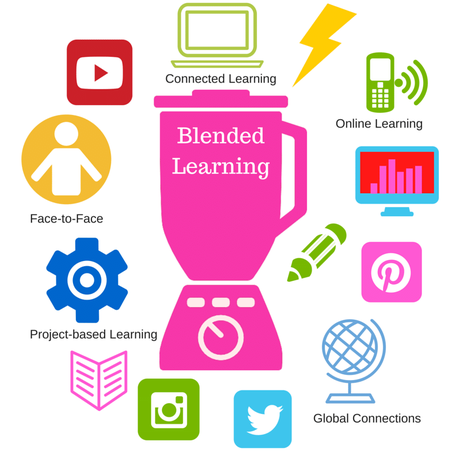
My Learning Manifesto
My Passion in Education
Ever since I can remember, I have had a passion for learning. From my elementary science projects and my middle school research based classes, to my graduate school literature review last semester, I have loved it all; the research, the collaboration, and the acquisition of new knowledge. As an educator and an adult student, I now realize what all these amazing learning experiences had in common. I was in charge of my own learning! I had choice and voice through authentic learning opportunities, creating a sense of ownership and pride in my work.
As a teacher and current graduate student, I have learned from my own educational experiences, and have vowed to be the kind of educator that creates fun, authentic, and student-centered learning experiences that students will remember for years to come.
Issues in Education
Unfortunately, not all my learning experiences were positive ones like mentioned above. I also had classes where the “learning” was basically the copying, memorizing, and regurgitation of information. These teacher-centered classes did not provide authentic learning opportunities, instead they were rigid and monotonous. Their only goal was to pass a test, even if only memorization had taken place. These classes were not tapping into my full potential as a student or preparing me for my future.
According to Dewey (1940), “The world is moving at a tremendous rate. Going no one knows where. We must prepare our children, not for the world of the past. Not for our world. But for their world. The world of the future." Although this quote was stated over eighty years ago, no major or significant change has been made to our current educational system. Today’s schools were designed over a century ago to standardize the way we teach and test. (Horn & Staker, 2015) Factors such as standardized testing and moving students from grade to grade on a fixed schedule creates a one size fits all approach. This has continued the very rigid and antiquated educational system of the past and is not conducive for the world of the future. Students must be able to learn how to learn, collaborate with others, and become self directed, life-long learners that will be prepared for their future.
Another current issue in education is the use of technology as a quick fix. In recent years, many districts have rushed to buy every student a digital device thinking that it will improve learning and achievement, but adding a digital device to the classroom without a fundamental change in the culture of teaching and learning will not lead to significant improvement (November, 2013). If used correctly though, technology can be used as a catalyst, or a tool that sparks significant change in learning.
Blended Learning:
Personalizing the Future of Education
According to Harapnuik et al., (2018), there is no denying that the standardized model of instruction proved to be an efficient way to get a large number of students to move into the industrial age, but we have progressed into the digital age where the challenges and opportunities that we face will not be met by a standardized learning model. He further states that if we really want to help students embrace an ever-changing future, we must create a significant learning environment (CSLE) in which we give our learners choice, ownership, and voice through authentic learning opportunities (COVA) (Harapnuik et al., 2018). By focusing on creating a student-centered learning model that provides students with choice, ownership, and voice, through authentic learning opportunities (COVA) first, we can ensure that the learning takes precedence. Then, students can learn to use the technology as a tool to enhance their learning.
For the last four months, I have been working alongside my classmates and colleagues, Veronica Balli and Ileana Reyna, to create a blended learning model with personalized and targeted instruction that we believe will lead to higher engagement and student achievement in our organization. Our vision is to provide students with a learning model that is tailored to their specific needs. One that will give them choice, ownership, and voice through authentic learning opportunities, putting them in charge of their own learning and making teachers the guides or facilitators. We plan to harness the power of technology to enhance learning which will enable students to choose the path and/or pace of their knowledge acquisition, once again giving them control over their learning.
Conclusion
As mentioned above, when I was in charge of my own learning and had choice and voice through authentic learning opportunities scattered throughout my educational journey, it created a sense of ownership and pride in my work. I want my students to feel that same way throughout the entirety of their educational journey. By creating and implementing a personalized blended learning model at our organization, we will be able to shift from the antiquated teacher-centered model to a more student-centered approach, where students can begin creating their own personalized path and be prepared for the world of the future.
References
danieljbmitchell. (2007, August 1). Progressive Education in the 1940s [Video]. YouTube. https://www.youtube.com/watch?v=opXKmwg8VQM&t=436s&ab_channel=danieljbmitchell
Harapnuik, D., Thibodeaux, T., Cummings, C. (2018). Choice, ownership, and voice through authentic learning [eBook]. Creative Commons License. http://tilisathibodeaux.com/wordpress/wp-content/uploads/2019/04/COVA_eBook_Jan_2018.pdf
Horn, M., Staker, H. (2015). Blended: Using disruptive innovation to improve schools. Jossey-Bass A Wiley Brand.
November, A. (2013, February 13). Why schools must move beyond one-to-one computing [Web log post]. Retrieved from http://novemberlearning.com/educational-resources-for-educators/teaching-andlearning-articles/why-schools-must-move-beyond-one-to-one-computing/












